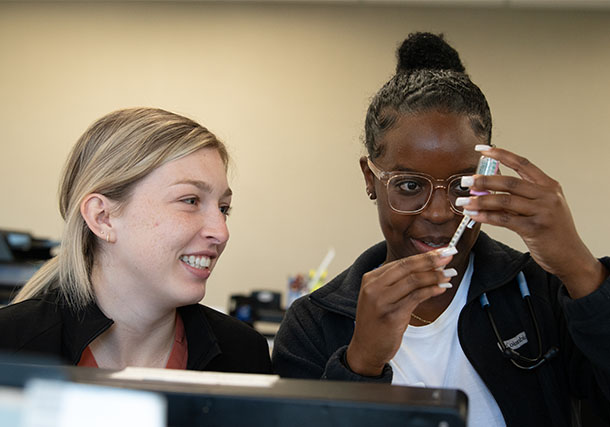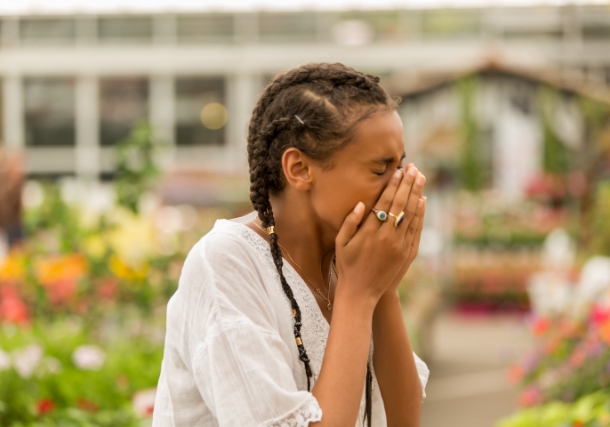
Rhinitis Treatment in Charlotte
Rhinitis can be a frustrating and difficult condition for many individuals, whether you’re afflicted seasonally or all year round. At Carolina Asthma & Allergy Center, we understand the impact that rhinitis can have on your lifestyle and well-being, and we are committed to providing comprehensive care to help manage and treat this condition.
Our team of board-certified allergists and experienced healthcare professionals is dedicated to providing personalized treatment plans and ongoing support to help you live your life to the fullest. Whether you are seeking a diagnosis, treatment, or ongoing management of your rhinitis so you can find relief from your symptoms, we are here to help you every step of the way.
Jump Ahead:
- How to Request an Appointment
- What is Rhinitis?
- What Causes Rhinitis?
- What are the Symptoms of Rhinitis?
- Treatment for Rhinitis in Charlotte
- What is Nonallergic Rhinitis?
- What are the Causes of Nonallergic Rhinitis?
- What are the Symptoms of Nonallergic Rhinitis?
- How is Nonallergic Rhinitis Diagnosed?
- How Can You Prevent Nonallergic Rhinitis?
- Treatment for Nonallergic Rhinitis in Charlotte
- Rhinitis FAQs
How to Request an Appointment
At Carolina Asthma and Allergy Center, we offer comprehensive evaluation and treatment for your rhinitis. If you suspect you may have rhinitis or have experienced symptoms that may be caused by rhinitis, you can request an appointment with our team of board-certified allergists and experienced healthcare professionals.
To schedule an appointment, you can call our office or fill out the online appointment request form on our website. Our friendly staff will work with you to find a convenient date and time for your visit.
During your appointment, our allergists will review your medical history, perform a physical exam, and conduct any necessary tests to determine if you have rhinitis. Based on your evaluation, our team will develop a personalized treatment plan to help manage your symptoms.
What is Rhinitis?
Often referred to as “hay fever” or “nasal allergies”, rhinitis occurs when a person inhales allergens. This may lead to nasal itching, sneezing, discharge and stuffiness as well as itching roof of mouth or ears.
Allergic rhinitis is a very common medical problem affecting more than 15 percent of the population, both adults and children.
One-third of individuals with rhinitis do not suffer from allergies. Nonallergic rhinitis is typically seen in adults and symptoms last year-round. If your doctor concludes that your symptoms are not the result of allergies or another sinus problem, you may have nonallergic rhinitis.

What Causes Rhinitis?
Allergic rhinitis is triggered by allergens including, but not limited to, pollen, mold, dust and animal dander. When a person with allergic rhinitis breathes in an allergen, their body reacts by releasing chemicals that lead to allergy symptoms.
Allergic rhinitis may vary based on the time of year, since weather impacts the amount of pollen in the air. For example, on hot, dry days there will be more pollen and allergens in the air. On cool, damp days allergens and pollen are washed to the ground.
What are the Symptoms of Rhinitis?
Symptoms of rhinitis include:
- Sneezing
- Post-nasal drip
- Watery, itchy eyes
- Headache
- Fatigue
Symptoms of allergic rhinitis vary from person-to-person, which is why it is important to make an appointment at a board-certified allergist to come up with the best treatment plan.
Treatment for Rhinitis in Charlotte
Your doctor may prescribe antihistamines to help reduce symptoms of allergic rhinitis. Allergy medications are typically most effective if begun before pollen is in the air and symptoms develop. Immunotherapy (allergy shots) may help provide long-term relief for individuals who suffer from allergic rhinitis. It’s important to speak with your doctor about the best treatment option for you.
What is Nonallergic Rhinitis?
Nonallergic rhinitis occurs when blood vessels in the sinuses fill with blood and fluid, causing a stuffy or runny nose. Unlike allergic rhinitis, this condition is not caused by allergens such as pollen, dust, pet dander, or mold. Symptoms also tend to be chronic rather than seasonal.
What are the Causes of Nonallergic Rhinitis?
Exactly what triggers nonallergic rhinitis varies from person to person. However, the most common cause is an acute viral infection like the common cold.
Other triggers include:
- Air pollutants. Smog, cigarette smoke, and other pollutants can irritate the lining of the nose. Strong odors from perfume and cleaning products can have a similar effect.
- Weather. Many people experience nonallergic rhinitis when the temperature or humidity changes quickly.
- Hormonal changes. Pregnancy and menstruation can cause nonallergic rhinitis. Hypothyroidism, a condition that occurs when the thyroid gland doesn’t produce enough thyroid hormone, can also lead to nasal congestion.
- Food. Hot and spicy foods stimulate the trigeminal sensory nerve which, in return, causes your nose to run.
- Alcohol. Both wine and beer contain high levels of histamine. This chemical triggers an immune response, leading to nasal congestion.
- Illegal drugs. Cocaine and other illicit drugs that are snorted can cause chronic nasal inflammation.
- Nasal polyps. In rare cases, symptoms are caused by nasal polyps. These are soft, noncancerous growths that form in the sinuses.
Medication Triggers
Certain medications can cause nasal inflammation and swelling. These include:
- ACE inhibitors to treat high blood pressure
- Alpha-blockers and beta-blockers
- Antidepressants
- Nonsteroidal anti-inflammatory drugs (NSAIDs)
- Hormonal medications (e.g., birth control)
- Sedatives
- Medicines that treat erectile dysfunction (ED)
Additionally, extended use of nasal decongestant sprays can trigger a specific type of nonallergic rhinitis called rhinitis medicamentosa or “rebound congestion.”
What are the Symptoms of Nonallergic Rhinitis?
Common symptoms of nonallergic rhinitis include:
- Sneezing
- Post-nasal drip
- Nasal congestion
- Runny nose
- Headache
- Ear and facial pain
- Sleep disturbances
- Fatigue
Based on these symptoms alone, it can be very difficult to distinguish between allergic and nonallergic rhinitis.
However, allergic rhinitis is typically accompanied by itchy eyes, nose, and throat whereas nonallergic rhinitis is not. Allergic rhinitis symptoms are also seasonal, whereas nonallergic rhinitis symptoms may persist year-round.
How is Nonallergic Rhinitis Diagnosed?
A board-certified allergist can diagnose your condition by conducting a physical exam and reviewing your medical history.
Depending on the severity of your symptoms, the medical provider may recommend allergy testing to determine if your nasal congestion is caused by allergens like dust and mold.
There are two main types of allergy tests:
- Skin prick test. Also referred to as percutaneous testing, this involves lightly scratching the skin and exposing it to allergens like dog dander, pollen, and dust mites. After 15 minutes, the allergist will check for a reaction.
- Blood test. A lab can test a sample of your blood for immunoglobulin E antibodies. These proteins release chemicals that cause allergy symptoms.
Additionally, your doctor may suggest a nasal endoscopy. During this procedure, a small, flexible tube with a camera is passed through the nostril to examine the sinuses for swelling, bleeding, and polyps.
How Can You Prevent Nonallergic Rhinitis?
For many people, nonallergic rhinitis is a chronic condition. That means it may come and go. Fortunately, there are steps you can take to prevent flare-ups.
Avoid Your Triggers
Many cases of nonallergic rhinitis are caused by environmental pollutants like cleaning products and cigarette smoke. To prevent symptoms, remove these substances from your home.
Nasal Rinsing
Irrigating your nose with saline every day can loosen mucus. It can also remove debris like dust and pollen from the sinuses. Just be sure to use sterile water.
Hydration
Drinking enough fluid helps loosen mucus. This allows it to drain from your sinuses. Adding moisture to the air with a humidifier can offer a similar effect.
Practice Good Hygiene
Most cases of nonallergic rhinitis are caused by viral infections. To prevent these illnesses, wash your hands frequently, avoid touching your face, and stay away from others who are sick.
Evaluate Medications
Certain medications like beta-blockers and NSAIDs can cause nonallergic rhinitis. Depending on the severity of your symptoms, you may work with your prescriber to find a different medication.
Avoid Extended Use of Nasal Decongestants
Prescribed and over-the-counter nasal decongestant sprays can offer fast relief. However, using these products for extended periods can actually make your nasal congestion worse.
Treatment for Nonallergic Rhinitis in Charlotte
Nonallergic rhinitis can be very uncomfortable. To receive the relief you deserve, you must seek the advice of a board-certified allergist. This medical professional can help you understand the source of your symptoms and then develop a comprehensive treatment plan.
This plan may include:
- Antihistamine nasal spray. An antihistamine nasal spray may be prescribed to reduce the symptoms of nonallergic rhinitis. Alternatively, an oral antihistamine like diphenhydramine (Benadryl) or loratadine (Claritin) may be recommended.
- Steroids. Depending on the severity of nasal swelling, your provider may recommend an oral or nasal steroid to reduce inflammation.
- Decongestants. These medications reduce congestion by narrowing the blood vessels lining the nose.
Sometimes, nasal symptoms are linked to both allergic and nonallergic triggers. You may, for example, have a mold allergy but also a sensitivity to cigarette smoke. In these situations, your allergist may recommend oral allergy medications. Just keep in mind that allergy medications are most effective if taken before symptoms arise.
Additionally, your medical provider may suggest immunotherapy or allergy shots. Immunotherapy works by slowly exposing your immune system to known allergens over time.
Summary
At Carolina Asthma and Allergy Center, we are dedicated to providing compassionate care and ongoing support to help you live your life to the fullest. Contact us today to request an appointment and take the first step towards managing your rhinitis.



